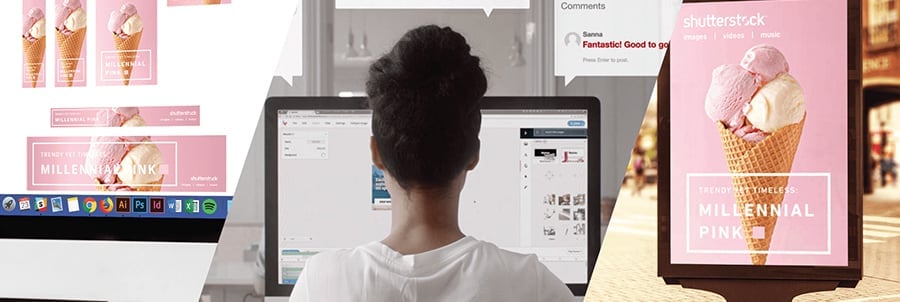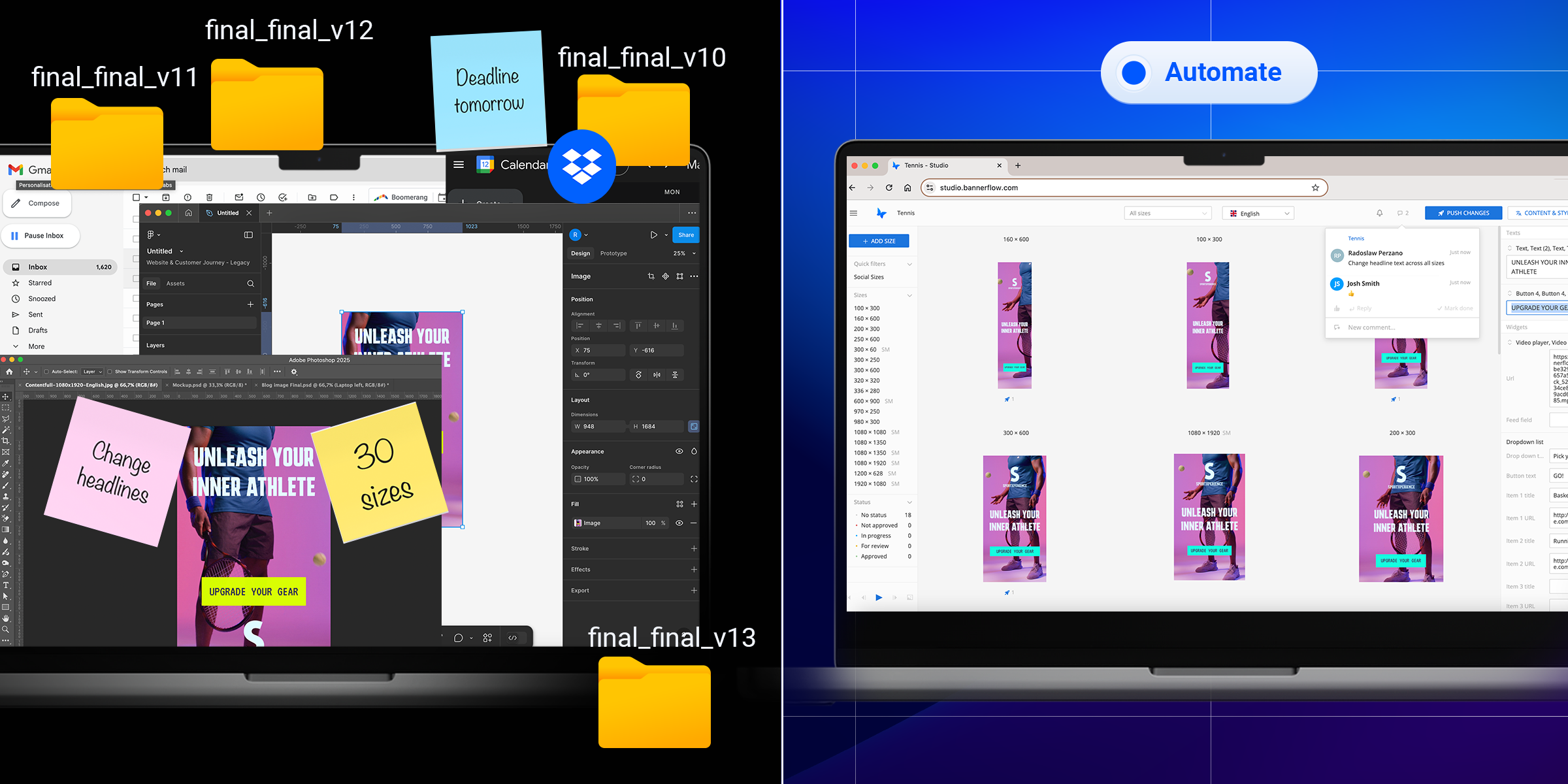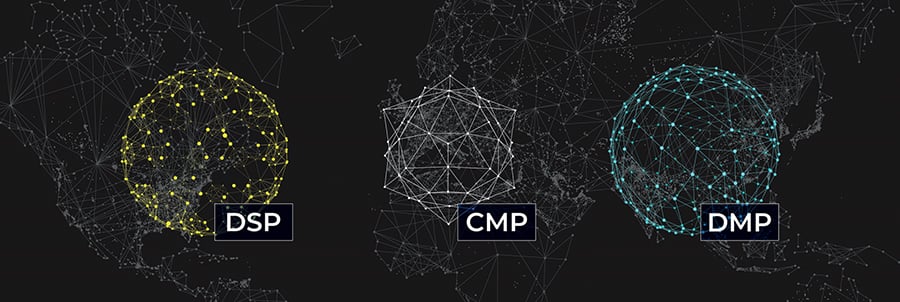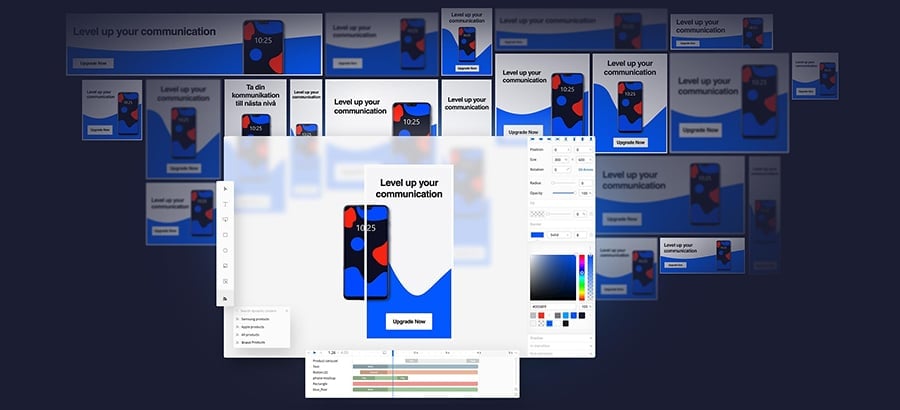Building a creative management platform, or CMP, is easy right? Especially if it hasn’t been invented, nor conceived of as an idea?
Indeed, every company has an origin tale and Bannerflow is no different. Each component of our CMP is a direct solution to a problem encountered by frustrated digital marketers.
If not for the thoughts and frustrations, of countless designers, marketing managers, translators, developers – a whole list too long to mention – Bannerflow’s platform simply wouldn’t exist.
The evolution of digital display
But why the need for a creative management platform?
Thanks to advances in digital technology, it became possible to sell and serve ads online with ease. However, the incredibly fast development of the humble banner ad was not matched with advances in production and distribution technologies.
Instead of it taking hours to build a campaign it might take days (or even weeks) to build a banner campaign. Sadly for some marketers, this old way of working is still the day-to-day reality of digital advertising.
The development of the creative management platform is a direct response to this mismatch.
Life without a creative management platform
Daniel Jacobsson, co-founder of Bannerflow, began his career as a banner designer in the late 2000s. He was looking forward to creating innovative digital advertisements.
Yet, like for so many, the reality couldn’t have been more different. He soon discovered that much of his day-to-day work involved tedious repetitive design tasks.
Day-in-day-out he would spend his working hours coding, copy-pasting, and optimising. As well as taking screenshots of hundreds of banners. There would be, in fact, little opportunity for creativity.
The origin of the Bannerflow CMP
But then something happened, Jacobsson began to imagine ways to make his life as a banner designer less monotonous. He began to design tools that simplified time-consuming tasks and removed wasteful repetitive design processes.
Methodically, he set to work. The result was a scaling tool. The very first feature of the Bannerflow platform. Its creation meant that creating thousands of banners, for multiple markets went from weeks to days.
For each pain point, and for every designer, marketer, or CMO producing campaigns the old way, there was a solution to be found.
The hard yards
Trapped in the same routine as Daniel, and on the other side of the marketing team divide, was Daniel Fahlén, marketing manager, and future co-founder of Bannerflow. Like Jacobsson, he too was fed-up wasting time on poor processes.
He found himself part of chaotic email threads and endlessly opening zip files. He too knew there had to be a better way to undertake online display advertising.
Instead of analysing and optimising display campaigns he was stuck doing the basics. He wanted to do more, try new strategies, even – heaven forbid – improve ad performance!
Needless to say, he and Jacobsson were kindred spirits. Joining forces, they saw the opportunity to design further features to benefit how he and countless other marketing managers worked.
And over a period of a few years, the Bannerflow CMP emerged.
But how did we get here?
The possibility of high-performance, in-house digital display did not happen overnight. The development of our CMP took time and effort, not just from the two Daniels but from a whole host of individuals who would go on to form Bannerflow.
Yet the question remains: what inspires you to go about building a creative management platform? Well, here’s Daniel Jacobsson to explain in his own words.
What did you do before Bannerflow?
DANIEL J: IGaming in Malta. Web design mainly within the creative team, producing design and copy for the main website, and banner ads. I imagined there’d be a lot of creativity and fancy things but a few weeks in I quickly understood banner production was tedious and took too much time – in fact, 90% of my time was banner ads.
Still, iGaming – even then (10 years ago) – was far ahead in terms of online marketing. I received orders for product banners, huge lists of different banner sizes, excel spreadsheets of different translations, animated banners, etc. I also had to design and code animations.
What was your day-to-day working like?
DANIEL J: Often I’d work on affiliate marketing – all the weird banner sizes, 50 sizes at least and in 10 different languages! I would first create my 3 main sizes and then the rest, recoding the animations every time for each size.
After the first 50 banners, I’d then translate: copy and pasting translations from spreadsheets into each individual banners. All the different language copy would mean small tweaks and adjustments to each banner.
Oh and fall back gifs were needed too. I’d have to open each banner, press play and wait for right frames to take a screenshot, before copy and pasting into Photoshop. 1500 screenshots would equal 500 gif animations.
And once the material was collated, I’d upload it to the affiliate platform. And that didn’t support bulk upload! Meaning I would upload each banner size, one-by-one, adding the metadata for each, as I went.
How did this way impact your ability to react?
DANIEL J: A spelling mistake in a particular language, design, or animation would throw everything out of whack! You’d have to go back to all the files, renew screenshots. And then replace files on the affiliate platform. A minor tweak, or update, could take one week to implement.
What pushed you over the edge?
DANIEL J: Well, the final straw, so to speak, was an order for 50 sizes for a single campaign, which expanded to another 20 markets. Which meant 100 plus added sizes, resulting in 2000 animations, and 2000 fallbacks. It was 4 weeks of full-on, hands-on, copy, paste, code. It was all a blur. That was the tipping point for me.
…
Oh, and a final word on the need for the introduction of live analytics and real-time optimisation from fellow co-founder Daniel Fahlén:
DANIEL F: Marketing courses and University taught you all about the importance of A/B testing but the reality was that you could never do it. Back then marketing didn’t understand how hard it was to do – only designers knew!
No one had a solution.
…
However, there was a solution and that was the creation of the creative management platform!
Innovation never ends
From humble beginnings, the Bannerflow CMP has evolved in functionality and focus. From solving the basic pains of digital display advertising to mastering ad performance in real-time.
An enterprise-level CMP, –of which Bannerflow can be described – enables far more than simply smoother banner production. From global dynamic ad campaigns, to local branding campaigns, Bannerflow is more than a simple build and scale tool.
Bannerflow now offers total transparent control over digital advertising, in-house.








